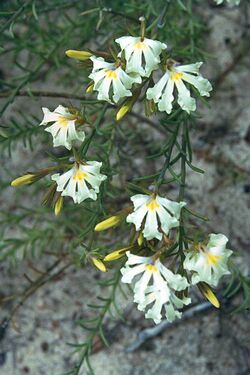Biology:Lechenaultia stenosepala
| Narrow-sepaled leschenaultia | |
|---|---|

| |
| Lechenaultia stenosepala near Jurien Bay | |
| Scientific classification | |
| Kingdom: | Plantae |
| Clade: | Tracheophytes |
| Clade: | Angiosperms |
| Clade: | Eudicots |
| Clade: | Asterids |
| Order: | Asterales |
| Family: | Goodeniaceae |
| Genus: | Lechenaultia |
| Species: | L. stenosepala
|
| Binomial name | |
| Lechenaultia stenosepala E.Pritz.[1]
| |
Lechenaultia stenosepala, commonly known as narrow-sepaled leschenaultia,[2] is a species of flowering plant in the family Goodeniaceae and is endemic to the south-west of Western Australia. It is an open, more or less erect perennial herb or shrub with crowded, narrow leaves, and blue to pale blue or creamy-white flowers.
Description
Lechenaultia stenosepala is an open, more or less erect perennial herb or shrub that typically grows to a height of 50 cm (20 in) and often forms suckers. The leaves are crowded on short stems, scattered on flowering stems and are 7.5–13 mm (0.30–0.51 in) long but narrow. The flowers are arranged in compact groups and are blue to pale blue or creamy-white. The sepals are 7.5–11 mm (0.30–0.43 in) long and the petals 13–19 mm (0.51–0.75 in) long with soft hairs inside the petal tube. The wings on the lobes are more or less equal and 0.9–2 mm (0.035–0.079 in) wide. Flowering occurs from October to December, and the fruit is 5–7 mm (0.20–0.28 in) long.[2][3]
Taxonomy
Lechenaultia stenosepala was first formally described in 1964 by Ernst Georg Pritzel in the Botanische Jahrbücher für Systematik, Pflanzengeschichte und Pflanzengeographie from specimens collected near Dandaragan.[4][5] The specific epithet (stenosepala) means "narrow-sepalled".[6]
Distribution and habitat
Narrow-sepaled leschenaultia grows in low, open heath between Three Springs and Gingin in the Avon Wheatbelt, Geraldton Sandplains, Jarrah Forest and Swan Coastal Plain biogeographic regions of south-western Western Australia.[2][3]
Conservation status
This leschenaultia is listed as "not threatened" by the Government of Western Australia Department of Biodiversity, Conservation and Attractions.[2]
References
- ↑ "Lechenaultia stenosepala". Australian Plant Census. https://biodiversity.org.au/nsl/services/apc-format/display/95697.
- ↑ 2.0 2.1 2.2 2.3 "Lechenaultia stenosepala". FloraBase. Western Australian Government Department of Parks and Wildlife. https://florabase.dpaw.wa.gov.au/browse/profile/7586.
- ↑ 3.0 3.1 Morrison, David A.. "Lechenaultia stenosepala". Australian Biological Resources Study, Department of Agriculture, Water and the Environment: Canberra. https://profiles.ala.org.au/opus/foa/profile/Lechenaultia%20stenosepala.
- ↑ "Lechenaultia stenosepala". APNI. http://id.biodiversity.org.au/instance/apni/519773.
- ↑ Pritzel, Ernst G. (1905). "Fragmenta Phytographiae Australiae occidentalis. Beitrage zur Kenntnis der Pflanzen Westaustraliens, ihrer Verbreitung und ihrer Lebensverhaltnisse". Botanische Jahrbücher für Systematik, Pflanzengeschichte und Pflanzengeographie 35 (4): 552–553. https://www.biodiversitylibrary.org/item/660#page/617/mode/1up. Retrieved 9 March 2022.
- ↑ Sharr, Francis Aubi; George, Alex (2019). Western Australian Plant Names and Their Meanings (3rd ed.). Kardinya, WA: Four Gables Press. p. 313. ISBN 9780958034180.
Wikidata ☰ Q17480195 entry
 |

